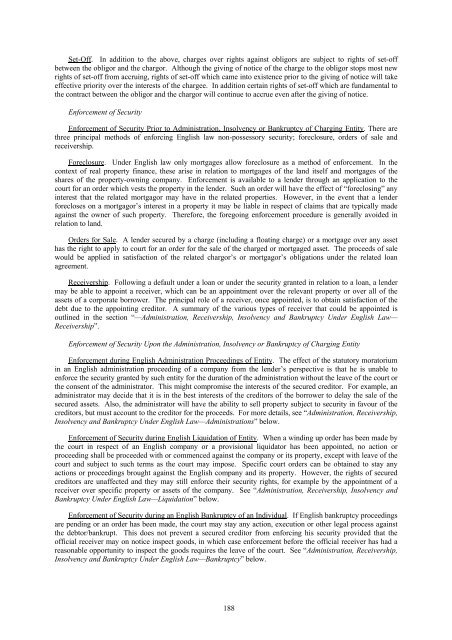Titan Europe 2007-1 (NHP) Limited - Irish Stock Exchange
Titan Europe 2007-1 (NHP) Limited - Irish Stock Exchange
Titan Europe 2007-1 (NHP) Limited - Irish Stock Exchange
You also want an ePaper? Increase the reach of your titles
YUMPU automatically turns print PDFs into web optimized ePapers that Google loves.
Set-Off. In addition to the above, charges over rights against obligors are subject to rights of set-off<br />
between the obligor and the chargor. Although the giving of notice of the charge to the obligor stops most new<br />
rights of set-off from accruing, rights of set-off which came into existence prior to the giving of notice will take<br />
effective priority over the interests of the chargee. In addition certain rights of set-off which are fundamental to<br />
the contract between the obligor and the chargor will continue to accrue even after the giving of notice.<br />
Enforcement of Security<br />
Enforcement of Security Prior to Administration, Insolvency or Bankruptcy of Charging Entity. There are<br />
three principal methods of enforcing English law non-possessory security; foreclosure, orders of sale and<br />
receivership.<br />
Foreclosure. Under English law only mortgages allow foreclosure as a method of enforcement. In the<br />
context of real property finance, these arise in relation to mortgages of the land itself and mortgages of the<br />
shares of the property-owning company. Enforcement is available to a lender through an application to the<br />
court for an order which vests the property in the lender. Such an order will have the effect of “foreclosing” any<br />
interest that the related mortgagor may have in the related properties. However, in the event that a lender<br />
forecloses on a mortgagor’s interest in a property it may be liable in respect of claims that are typically made<br />
against the owner of such property. Therefore, the foregoing enforcement procedure is generally avoided in<br />
relation to land.<br />
Orders for Sale. A lender secured by a charge (including a floating charge) or a mortgage over any asset<br />
has the right to apply to court for an order for the sale of the charged or mortgaged asset. The proceeds of sale<br />
would be applied in satisfaction of the related chargor’s or mortgagor’s obligations under the related loan<br />
agreement.<br />
Receivership. Following a default under a loan or under the security granted in relation to a loan, a lender<br />
may be able to appoint a receiver, which can be an appointment over the relevant property or over all of the<br />
assets of a corporate borrower. The principal role of a receiver, once appointed, is to obtain satisfaction of the<br />
debt due to the appointing creditor. A summary of the various types of receiver that could be appointed is<br />
outlined in the section “—Administration, Receivership, Insolvency and Bankruptcy Under English Law—<br />
Receivership”.<br />
Enforcement of Security Upon the Administration, Insolvency or Bankruptcy of Charging Entity<br />
Enforcement during English Administration Proceedings of Entity. The effect of the statutory moratorium<br />
in an English administration proceeding of a company from the lender’s perspective is that he is unable to<br />
enforce the security granted by such entity for the duration of the administration without the leave of the court or<br />
the consent of the administrator. This might compromise the interests of the secured creditor. For example, an<br />
administrator may decide that it is in the best interests of the creditors of the borrower to delay the sale of the<br />
secured assets. Also, the administrator will have the ability to sell property subject to security in favour of the<br />
creditors, but must account to the creditor for the proceeds. For more details, see “Administration, Receivership,<br />
Insolvency and Bankruptcy Under English Law—Administrations” below.<br />
Enforcement of Security during English Liquidation of Entity. When a winding up order has been made by<br />
the court in respect of an English company or a provisional liquidator has been appointed, no action or<br />
proceeding shall be proceeded with or commenced against the company or its property, except with leave of the<br />
court and subject to such terms as the court may impose. Specific court orders can be obtained to stay any<br />
actions or proceedings brought against the English company and its property. However, the rights of secured<br />
creditors are unaffected and they may still enforce their security rights, for example by the appointment of a<br />
receiver over specific property or assets of the company. See “Administration, Receivership, Insolvency and<br />
Bankruptcy Under English Law—Liquidation” below.<br />
Enforcement of Security during an English Bankruptcy of an Individual. If English bankruptcy proceedings<br />
are pending or an order has been made, the court may stay any action, execution or other legal process against<br />
the debtor/bankrupt. This does not prevent a secured creditor from enforcing his security provided that the<br />
official receiver may on notice inspect goods, in which case enforcement before the official receiver has had a<br />
reasonable opportunity to inspect the goods requires the leave of the court. See “Administration, Receivership,<br />
Insolvency and Bankruptcy Under English Law—Bankruptcy” below.<br />
188

















